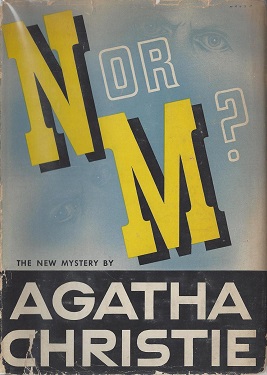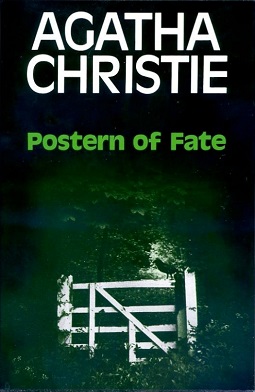
Crime fiction, detective story, murder mystery, mystery novel, and police novel are terms used to describe narratives that centre on criminal acts and especially on the investigation, either by an amateur or a professional detective, of a crime, often a murder. Most crime drama focuses on criminal investigation and does not feature the courtroom. Suspense and mystery are key elements that are nearly ubiquitous to the genre.

Mystery is a fiction genre where the nature of an event, usually a murder or other crime, remains mysterious until the end of the story. Often within a closed circle of suspects, each suspect is usually provided with a credible motive and a reasonable opportunity for committing the crime. The central character is often a detective, who eventually solves the mystery by logical deduction from facts presented to the reader. Some mystery books are non-fiction. Mystery fiction can be detective stories in which the emphasis is on the puzzle or suspense element and its logical solution such as a whodunit. Mystery fiction can be contrasted with hardboiled detective stories, which focus on action and gritty realism.

Cards on the Table is a detective fiction novel by the English author Agatha Christie, first published in the UK by the Collins Crime Club on 2 November 1936 and in the US by Dodd, Mead and Company the following year. The UK edition retailed at seven shillings and sixpence (7/6) and the US edition at $2.00.

Death in the Clouds is a work of detective fiction by British writer Agatha Christie, published in 1935. It features the Belgian detective Hercule Poirot and Chief Inspector Japp. It is a "closed circle" murder mystery: the victim is a passenger on a cross-Channel aircraft flight, and the perpetrator can only be one of eleven fellow-passengers and crew.

The A.B.C. Murders is a work of detective fiction by British writer Agatha Christie, featuring her characters Hercule Poirot, Arthur Hastings and Chief Inspector Japp, as they contend with a series of killings by a mysterious murderer known only as "A.B.C.". The book was first published in the UK by the Collins Crime Club on 6 January 1936, sold for seven shillings and sixpence (7/6) while a US edition, published by Dodd, Mead and Company on 14 February of the same year, was priced $2.00.

N or M? is a work of detective fiction by Agatha Christie first published in the US by Dodd, Mead and Company in 1941 and in the UK by the Collins Crime Club in November of the same year. The US edition retailed $2.00 and the UK edition at seven shillings and sixpence (7/6).
Victor Gollancz Ltd was a major British book publishing house of the twentieth century and continues to publish science fiction and fantasy titles as an imprint of Orion Publishing Group.

Edith Caroline Rivett was a British crime writer, who wrote under the pseudonyms E. C. R. Lorac, Carol Carnac and Mary Le Bourne during the golden age of detective fiction.

They Came to Baghdad is an adventure novel by Agatha Christie, first published in the United Kingdom by the Collins Crime Club on 5 March 1951 and in the United States by Dodd, Mead and Company later in the same year. The UK edition retailed at eight shillings and sixpence (8/6) and the US edition at $2.50.

Postern of Fate is a work of detective fiction by Agatha Christie that was first published in the UK by the Collins Crime Club in October 1973 and in the US by Dodd, Mead and Company later in the same year. The UK edition retailed at £2.00 and the US edition at $6.95.

Trio for Blunt Instruments is a collection of Nero Wolfe mystery novellas by Rex Stout, published in 1964 by the Viking Press in the United States and simultaneously by MacMillan & Company in Canada. The book comprises three stories:

Three for the Chair is a collection of Nero Wolfe mystery novellas by Rex Stout, published by the Viking Press in 1957, and by Bantam Books in various paperback printings beginning in 1958. The book contains three stories: it can also be considered as a fix-up novel.

Avon Publications is one of the leading publishers of romance fiction. At Avon's initial stages, it was an American paperback book and comic book publisher. The shift in content occurred in the early 1970s with multiple Avon romance titles reaching and maintaining spots in bestseller lists, demonstrating the market and potential profits in romance publication. As of 2010, Avon is an imprint of HarperCollins.
The Crime Club was an imprint of the Doubleday publishing company, which later spawned a 1946-47 anthology radio series, and a 1937-1939 film series.

Miss Marple's Final Cases and Two Other Stories is a short story collection written by Agatha Christie and first published in the UK by Collins Crime Club in October 1979 retailing at £4.50. It was the last Christie book to be published under the Collins Crime Club imprint although HarperCollins continue to be the writer's UK publishers.

Please Pass the Guilt is a Nero Wolfe detective novel by Rex Stout, published by the Viking Press in 1973. Unusually for a Nero Wolfe story, which mostly take place very near the time of publication, this novel is set in 1969, though it was originally published in 1973.
The Nancy Drew Mystery Stories is the long-running "main" series of the Nancy Drew franchise, which was published under the pseudonym Carolyn Keene. There are 175 novels — plus 34 revised stories — that were published between 1930 and 2003 under the banner; Grosset & Dunlap published the first 56, and 34 revised stories, while Simon & Schuster published the series beginning with volume 57.
Angry Robot is a British-based publishing house dedicated to producing modern adult science fiction and fantasy, or as they call it “SF, F and WTF?!?”. The Nottingham-based company first released books in the UK in 2009, and since September 2010 has simultaneously been publishing its titles in the US as well, as a distributed client of Random House. All titles are released as paperbacks and eBooks.
William Collins, Sons & Co., often referred to as Collins, was a Scottish printing and publishing company founded by a Presbyterian schoolmaster, William Collins, in Glasgow in 1819, in partnership with Charles Chalmers, the younger brother of Thomas Chalmers, the minister of Tron Church in Glasgow.
John George Haslette Vahey was a versatile and prolific Northern Irish author of detective fiction in the genre's Golden Age in the 1920s and 1930s. Although his work has remained largely out of print since the end of the golden age, he is now enjoying a resurgence of popularity, and some of his work is again in print, or available as e-books.














